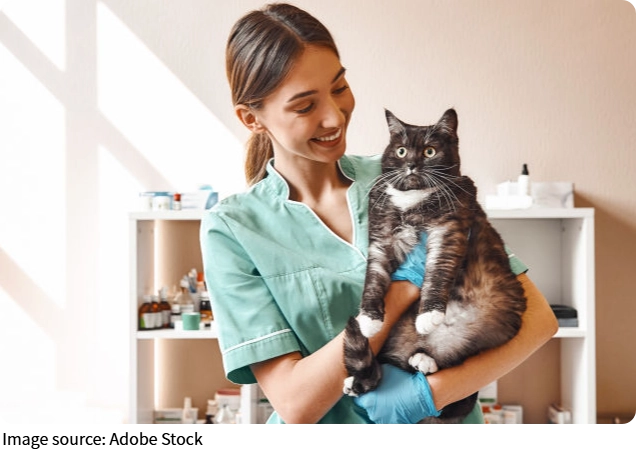Pet Health

As a pet owner, one of the most important responsibilities is ensuring your pet's health and well-being. Just like humans, pets are susceptible to diseases and infections that can compromise their quality of life.
Thankfully, with proper care, preventive measures, and regular vaccinations, many of these illnesses can be avoided or managed.
In this article, we'll dive into common pet diseases, why vaccinations are crucial, and how you can effectively manage your pet's health.
Understanding Common Pet Diseases
Just like humans, pets are vulnerable to a range of diseases that can affect their overall health. The most common diseases vary depending on the type of pet—dogs, cats, rabbits, and even reptiles each face different health risks.
For dogs, some of the most prevalent diseases include parvovirus, distemper, canine influenza, and heartworm disease. Parvovirus, for example, is a highly contagious viral infection that affects a dog's gastrointestinal system. It can be fatal if left untreated, which is why prevention through vaccines is essential.
Cats, on the other hand, are prone to feline leukemia, feline distemper, and upper respiratory infections like feline herpesvirus. These conditions, though serious, can often be managed with vaccines and good health practices.
For smaller pets like rabbits, diseases like myxomatosis and rabbit hemorrhagic disease (RHD) are significant concerns, as they can be fatal. Although less common, reptiles can also face health issues like respiratory infections and intestinal parasites, which require careful management.
Regardless of the pet species, all of these diseases have one thing in common—they can often be prevented with the right vaccinations and preventive care.
The Importance of Vaccinations
Vaccination is one of the most effective ways to protect your pet from preventable diseases. Vaccines work by stimulating the immune system to recognize and fight specific pathogens, so that your pet's body can combat infections if exposed in the future.
Why is it important? Vaccines are vital because they prevent diseases that can be severe or even fatal. For example, a dog vaccinated against rabies will be less likely to develop the disease if exposed to an infected animal, and the same goes for diseases like distemper or parvovirus. For cats, vaccinations can protect against fatal conditions like feline leukemia virus (FeLV) and feline immunodeficiency virus (FIV).
Not only do vaccines protect your pet, but they also protect other animals and humans, particularly in the case of zoonotic diseases (diseases that can be transmitted between animals and humans). Rabies, for instance, is a zoonotic disease that can be deadly to both pets and humans, making vaccination even more important.
Most veterinary clinics offer a set of core vaccines for pets, which are essential for their overall health. The timing and frequency of vaccinations can vary depending on the species, age, and risk factors of the pet. Typically, pets receive a series of vaccines as puppies or kittens, followed by boosters to maintain their immunity.
Managing Your Pet's Health: Preventive Care Beyond Vaccines
While vaccinations are crucial, they are just one part of a larger picture when it comes to maintaining your pet's health. In addition to vaccines, regular health checks, proper nutrition, parasite prevention, and hygiene all play a significant role in disease prevention.
1. Regular Veterinary Checkups: It's important to schedule regular vet visits to monitor your pet's health. These checkups help catch any health issues early, before they become more serious or harder to treat. Your vet can also provide guidance on additional preventive measures, such as spaying or neutering, dental care, and more.
2. Parasite Control: Fleas, ticks, and worms are common parasites that can affect pets, leading to health problems like anemia, Lyme disease, and gastrointestinal issues. Use veterinarian-recommended flea and tick preventatives, and deworm your pet regularly to keep them parasite-free.
3. Proper Nutrition: A well-balanced diet is crucial to your pet's overall health. The right nutrition helps maintain a healthy weight, supports the immune system, and provides energy for everyday activities. Be sure to feed your pet a high-quality, species-appropriate food and avoid overfeeding, which can lead to obesity.
4. Dental Care: Dental disease is one of the most overlooked aspects of pet health. Poor dental hygiene can lead to gum disease, tooth loss, and systemic infections. Regular teeth brushing, dental treats, or professional cleanings from the vet can help maintain your pet's dental health.
How to Stay on Top of Vaccines and Preventive Care
As a responsible pet owner, staying on top of your pet's health care schedule can be a challenge with all the responsibilities that come with pet ownership. Here are a few tips to ensure you never miss an important vaccination or preventive treatment:
1. Keep a Pet Health Calendar: Track your pet's vaccination dates, flea treatments, and vet appointments by creating a health calendar. Many veterinary clinics also send reminders when vaccinations or checkups are due, so be sure to stay in contact with your vet.
2. Be Aware of Risk Factors: Depending on your pet's lifestyle, you may need additional vaccines or preventive measures. For example, pets who interact with other animals regularly may need more frequent vaccinations or parasite treatments.
3. Ask Your Veterinarian: Your vet is your best resource when it comes to maintaining your pet's health. They can recommend a vaccination schedule tailored to your pet's specific needs, whether they're a dog, cat, or exotic pet.

In Conclusion: Preventive Care Is Key
Ensuring your pet stays healthy is more than just reacting to illness—it's about being proactive with regular vaccinations and preventive care. From protecting them against dangerous diseases like rabies and distemper to ensuring they're free from parasites, taking the time to understand and manage your pet's health can lead to a long, happy life together.
By staying informed about common pet diseases, vaccines, and preventive measures, you're not only improving the quality of your pet's life but also contributing to a stronger, more vibrant bond with your furry or scaly companion.


